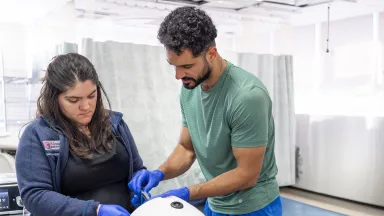Reproductive Genetics
Clinical research is a basic component of the Division of Reproductive Genetics. The research focus of the division is to further our knowledge and understanding of the interface between women's health care and the latest advances in medical genetics.
Fetal and Newborn Down syndrome and related disorders
The FASTER trial: First And Second Trimester Evaluation of Risk for Aneuploidy; NICHD 1 R01 HD38652-01 (Dr. Susan Gross - Site Principal Investigator)
This study has just been completed and has demonstrated the utility of first trimester ultrasound and serum testing for the detection and screening of Down syndrome in pregnancy. The Division of Reproductive Genetics is now implementing this program to residents of Bronx and Westchester counties.
New York State Department of Health Empire State Grant Training Program. The Individual and Epidemiologic Experience of Down Syndrome, Trisomy 18, and Neural Tube Defects after Almost 20 Years of Antenatal Maternal Serum Screening (Dr. Susan Gross - Program Director).
There are two aims of this current study. The first aim is to understand the experience of women and families who have had a child with Down syndrome, Trisomy 18 or neural tube defects. The second aim is to look at the broader statistical data from the New York State databases to ascertain whether there has been any change with respect to the incidence of these disorders. Such information will be analyzed and use to enhance the detection and management of these disorders and, most importantly, improve the current perinatal care provided to such families and their children.
Differential Gene expression in Down syndrome placentae; NIH R03HD040342-01A1 (Dr. Susan Gross - Principal Investigator)
This study looks at placental alterations in cases of Down syndrome pregnancies using the latest molecular genetic techniques. The aims of this study are to determine whether more efficient markers can be developed to detect or diagnose Down syndrome in pregnancy and to improve our understanding of placental function in such pregnancies. There is a much higher risk of stillbirth and birth defects in pregnancies affected with Down syndrome, and such knowledge may help us improve the outcomes of these newborns.





